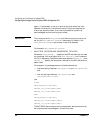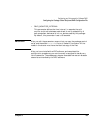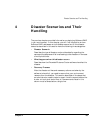
Disaster Scenarios and Their Handling
Chapter 490
This is a multiple failure
scenario where the failures
occur in a particular sequence in
the configuration that
corresponds to figure 2 where
Ethernet and FC links do not go
over DWDM.
The RPO_TARGET for the package
P1 is set to IGNORE.
The package is running on Node
1. P1 uses a mirror md0
consisting of S1 (local to node
N1, - /dev/hpdev/mylink-sde)
and S2 (local to node N2). The
first failure occurs when all FC
links between the two data
centers fail, causing Node 1 to
lose access to S2 and Node 2 to
lose access to S1.
After sometime a second failure
occurs. Node 1 fails (because of
power failure)
The package (P1) continues
to run on Node 1 after the
first failure, with the MD0
that consists of only S1.
After the second failure, the
package P1 fails over to N2
and starts with S2. Data
that was written to S1 after
the FC link failure is now
lost because the
RPO_TARGET was set to
IGNORE.
In this scenario, no attempts are
made to repair the first failure
until the second failure occurs.
Typically the second failure occurs
before the first failure is repaired.
1. To recover from the first
failure, restore the FC links
between the data centers. As a
result, S1 is accessible from
N2.
2. Run the following command to
add S1 to md0 on N2:
# mdadm --add /dev/md0
/dev/hpdev/mylink-sde
This command initiates the
re-mirroring process. When it
is complete, the extended
distance cluster detects S1
and accepts it as md0.
For the second failure, restore N1.
Once it is restored, it joins the
cluster and can access S1 and S2.
1. Run the following command to
enable P1 to run on N1
# cmmodpkg -e P1 -n N1
Table 4-1 Disaster Scenarios and Their Handling (Continued)
Disaster Scenario
What Happens When
This Disaster Occurs
Recovery Process


















